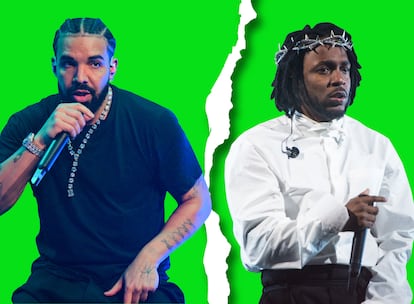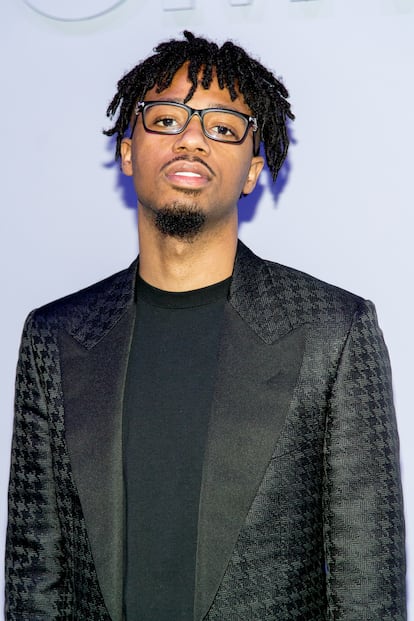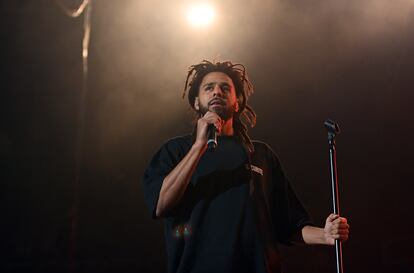‘Two old men losing relevance’: Drake and Kendrick Lamar are fighting a ‘rap civil war’
One is a committed Pulitzer Prize-winning artist and the other has outsold Michael Jackson. For months, their rivalry has been rapped through songs that have targeted some of the industry’s biggest names

The beef, the battle, the diss track. There are various ways to label a musical showdown between two hip-hop artists. Confrontation has been a part of rap since its birth, and in the 1980s, a dispute that sprang up around 14-year-old Roxanne Shante’s track “Roxanne’s Revenge” became major news. Forty years later, beefs are still forming between two or more artists, and serve to gain media attention, followers, and business. Over the last month, one in particular has stirred up the entire genre. In a recent article, Billboard called it the “rap civil war.” The conflict involves two of the world’s biggest performers: Drake and Kendrick Lamar.
Both are worldwide best-sellers. They’ve won Grammy and Billboard awards, headlined numerous festivals, racked up dozens of platinum releases and over 60 million monthly listeners on Spotify. Drake bests Lamar by the numbers, with 80 million listeners, but Lamar has something that neither Drake, nor practically anyone else in the field, can boast: a 2018 Pulitzer Prize for musical composition on his album Damn. The achievement made him the first popular music composer to win the award, so elevating rap to a higher echelon.
Critics are nearly unanimous in their characterization of Lamar as the best rapper of his generation. If hip-hop is among the most-listened-to genres in the world, it is thanks to artists like him. But being talented doesn’t always mean that you get along with your peers. In fact, among artists this big, competition only adds a certain shine to their legend.
At first, there were three
Lamar and Drake collaborated more than 12 years ago on songs like Poetic Justice, but afterwards they never quite saw eye to eye, as they hinted at in several interviews.
Simply put, the two have different ideas of what makes art. Drake wants to be a hip-pop superstar, a figure as popular as Michael Jackson, who the Canadian has already surpassed in terms of number one singles on the Billboard Hot 100 list. In contrast, Lamar looks to transcend with a message, one that goes beyond commercial success. The Compton-born rapper speaks of anti-racism and denounces social inequality.
For years, fans speculated about the rivalry between the pair via the cryptic messages they heard in their songs. Still, the “civil war” identified by Billboard didn’t explode until a month ago, when two other superstars of the genre — Future and producer Metro Boomin — invited Lamar to collaborate on one of the most anticipated releases in the rap game: the album and its song with the same name, We Don’t Trust You. Lamar also appears with them on the song Like That, which went to number one on various streaming platforms.
“Say, it’s a lot of goofies with a check,” raps Lamar on the song in reference to Drake and J. Cole, also making a play on canine-themed words in reference to the last album the two put out, For All the Dogs. On that release, J. Cole said that he, Drake, and Lamar were the “big three” of rap. But Lamar shot back: “Motherfucker big three, it’s just big me.” The Compton-born star wanted to distance himself from the others. “Prince outlived Mike Jack,” says Lamar in reference to Drake’s MJ affiliation, declaring that Prince’s more politically and socially daring work triumphed, as compared to Jackson’s ultra-commercial pop.

From the beef to the high school hallway
Of course, Lamar received a response. 7 Minute Drill was the track released by J. Cole three weeks ago on his EP Might Delete Later. It insinuated that Lamar’s career had “fell off like The Simpsons.” Still, in a move that seemed appropriate given the EP’s title, shortly afterward he took the song off of streaming platforms. Cole gave up quick. Just three days after putting it out, the German-born U.S. rapper erased the song and apologized. “Man, that’s the lamest shit I ever did in my fucking life,” he confessed to the crowd at the Dreamville festival at the start of April, adding that he felt horrible after putting out the song. “How many people think Kendrick Lamar is one of the greatest motherfuckers that ever touched a fucking microphone?” asked Cole, raising a hand to the fans gathered at the North Carolina festival. For many rappers and spectators, the move conclusively eliminated Cole from the supposed “big three.” And then there were two.
As in all great rivalries, camps have emerged. Metro Boomin and Future — with whom Drake has released more than 30 songs — have aligned themselves with Lamar. As if the entire music scene had it in for the Canadian, other detractors began to emerge. On a new album, We Still Don’t Trust You, A$AP Rocky, The Weeknd, and once again, Metro Boomin and Future, took advantage of the moment to mess with Drake. Others felt no need to deliver their insults as part of a group. Former Drake friend Rick Ross spoke openly on April 15 via song Champagne Moments of a supposed butt surgery the artist had undergone. Kanye West seized the opportunity to once again discredit the artist with a remix of Like That. There’s a high school feeling in this sequence, of when many band together to make fun of the kid who is losing the game.
It was Drake’s turn to respond. Push Ups came out on April 19. “I could never be nobody number-one fan. Your first number one, I had to put it in your hand. You pussies can’t get booked outside America for nan,’” Drake begins, making a reference to Lamar’s sparse hit songs and the measures he had to take to get them, like collaborating with Future. “What the fuck is this, a twenty-v-one?” he asks. “Metro, shut your ho ass up and make some drums,” he levels at his onetime producer. Drake also mentions Lamar’s short stature.
Kendrick still hadn’t responded when Drake released a second song: Taylor Made Freestyle. In it, he speculates that Lamar hadn’t responded yet because he didn’t want to take focus away from the new album released by his friend Taylor Swift. He also used AI-generated voices of the deceased Tupac Shakur and Snoop Dogg, criticizing the supposed cowardice of Lamar. The two other rappers are from the same area of Los Angeles as Lamar, who has always claimed the West Coast. Is it ethical to put out a song with the imitation of a dead rapper’s voice? “It’s complicated to talk about ethics in the middle of a beef. Drake’s light and comic approach comes off well compared to Kendrick Lamar’s scowl, but it seems a bit ridiculous to me to put California’s great legends to making fun of the new legend of Californian rap. It’s a forced move,” hip-hop journalist Santiago Cembrano tells EL PAÍS. Drake didn’t emerge from the play unscathed: Shakur’s estate threatened to sue, forcing him to remove the song from streaming platforms and social media.
Though April 2024 has been a historic month for cruel, high-impact U.S. rap beef, it can’t touch the scale of violence that was unleashed decades ago. For all the explosion sound effects that introduce a Metro Boomin track and Drake’s warlike lyrics, for journalists like Pitchfork’s Alphonso Pierre, this dispute will stick to music and never reach the level that ended the lives of rappers like Tupac and the Notorious B.I.G., who were seemingly assassinated by gang-affiliated groups. “A lot of rich guys arguing” was the headline that U.K. publication The Guardian went with on its analysis of the impact that the beef has achieved.
But after two songs, Lamar was never going to remain silent. Two weeks days after Drake’s first response, Lamar has spoken out. Euphoria is the name of the song, and in it, the Californian launches a multi-front attack on the man who would be global hip-hop’s king. The title could be the first shot: Drake is the executive producer of the famous HBO series, which has been criticized for its sexualization of U.S. teenagers.
Lamar touches on various styles throughout the track, but it begins with Drake’s favorite, R&B. The use of Tupac’s voice was always going to have consequences, and Lamar accuses him of having made “Pac turn in his grave.” Euphoria is full of double meanings and metaphors, but it leaves its thesis clear. It goes for the jugular: “This ain’t been about critics, not about gimmicks, not about who the greatest. It’s always been about love and hate, now let me say I’m the biggest hater.” If Drake was taking this as a joke, Lamar responded with his entire arsenal: “I hate the way that you walk, the way that you talk, I hate the way that you dress, I hate the way that you sneak diss. If I catch flight, it’s gon’ be direct.” Lamar even asks him to stop saying the n-word because the Canadian isn’t Black enough. “Kendrick showed that he’s not playing games and made a cultural criticism of everything Drake represents,” says Cembrano. For Lamar, the important thing was the practically irreconcilable dichotomy between the two rappers when it comes to hip-hop. “It functions as an open debate between two very distinct paradigms of rap, both supremely successful according to their own standards. You know when a style is resonating with a large public when Drake takes it on or copies it to get a big hit. Lamar has albums in which he analyzes the great human passions, that point to great works of art.” The performers present, for Cembrano, two ways of looking at the aging of hip-hop: “It allows us to understand an era that is coming to a close with its last glimmers.”
“They are a couple of old men losing relevance quickly in a generational handover,” says Alexia G. Ferrer, a music journalist for the Spanish publication Acero who specializes in hip-hop. This conflict is a collaboration between two artists that is drumming up expectations and curiosity. “What this beef has generated demonstrates that the model of absolute titans battling for the throne is still strong, although it’s not clear how this will translate in the future,” says Cembrano. “This might lead to the renovation of the hip-hop scene in general,” adds Ferrar. Be that as it may, whether this is the end or merely the first clash is up to Drake.

Sign up for our weekly newsletter to get more English-language news coverage from EL PAÍS USA Edition
Tu suscripción se está usando en otro dispositivo
¿Quieres añadir otro usuario a tu suscripción?
Si continúas leyendo en este dispositivo, no se podrá leer en el otro.
FlechaTu suscripción se está usando en otro dispositivo y solo puedes acceder a EL PAÍS desde un dispositivo a la vez.
Si quieres compartir tu cuenta, cambia tu suscripción a la modalidad Premium, así podrás añadir otro usuario. Cada uno accederá con su propia cuenta de email, lo que os permitirá personalizar vuestra experiencia en EL PAÍS.
¿Tienes una suscripción de empresa? Accede aquí para contratar más cuentas.
En el caso de no saber quién está usando tu cuenta, te recomendamos cambiar tu contraseña aquí.
Si decides continuar compartiendo tu cuenta, este mensaje se mostrará en tu dispositivo y en el de la otra persona que está usando tu cuenta de forma indefinida, afectando a tu experiencia de lectura. Puedes consultar aquí los términos y condiciones de la suscripción digital.









































